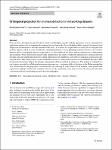Item Infomation
Full metadata record
| DC Field | Value | Language |
|---|---|---|
| dc.contributor.author | David, Cortes-Polo | - |
| dc.contributor.author | Luis I., Jimenez | - |
| dc.contributor.author | Mercedes E., Paoletti | - |
| dc.date.accessioned | 2023-05-25T04:32:41Z | - |
| dc.date.available | 2023-05-25T04:32:41Z | - |
| dc.date.issued | 2023 | - |
| dc.identifier.uri | https://link.springer.com/article/10.1007/s12652-023-04605-w | - |
| dc.identifier.uri | https://dlib.phenikaa-uni.edu.vn/handle/PNK/8506 | - |
| dc.description | CC BY | vi |
| dc.description.abstract | In recent years, the impressive growth of new wireless technologies, together with the appearance of new requirements in applications and services, is progressively changing the use of networks. Due to the high mobility required, the network must adapt to the infrastructure to meet the demands of the users. As a result, service providers currently have to over-provision network capacity, which is costly. In addition, considering efficient resource planning in advance involves a lot of labor-intensive efforts. Consequently, network usage analysis is a very useful tool that allows network administrators to find patterns and anomalies. Whilst pattern detection provides administrators the ability to define the infrastructure, anomaly detection provides rich and valuable information for certain applications, for example, to avoid network saturation in urban areas during peak hours. | vi |
| dc.language.iso | en | vi |
| dc.publisher | Springer | vi |
| dc.subject | Orthogonal projection | vi |
| dc.title | Orthogonal projection for anomaly detection in networking datasets | vi |
| dc.type | Book | vi |
| Appears in Collections | ||
| OER - Kỹ thuật điện; Điện tử - Viễn thông | ||
Files in This Item:

